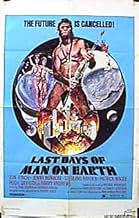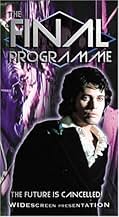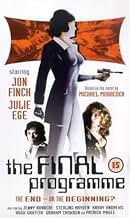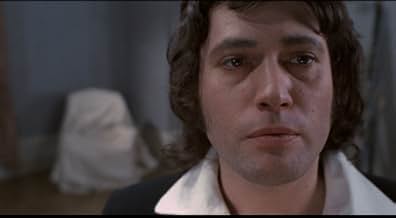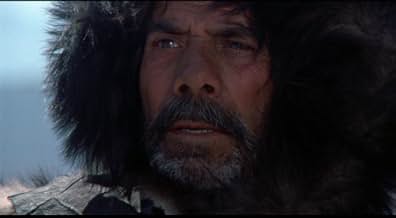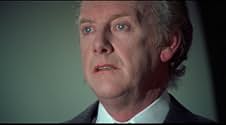IMDb RATING
5.4/10
1.2K
YOUR RATING
A trio of scientists plan to create a self-replicating, immortal, hermaphrodite using the Final Programme developed by a dead, Nobel Prize-winning scientist.A trio of scientists plan to create a self-replicating, immortal, hermaphrodite using the Final Programme developed by a dead, Nobel Prize-winning scientist.A trio of scientists plan to create a self-replicating, immortal, hermaphrodite using the Final Programme developed by a dead, Nobel Prize-winning scientist.
- Awards
- 1 win & 1 nomination total
Sandy Ratcliff
- Jenny
- (as Sandy Ratcliffe)
Mary MacLeod
- Nurse
- (as Mary Macleod)
Delores Delmar
- Fortune Teller
- (as Dolores Del Mar)
- Director
- Writers
- All cast & crew
- Production, box office & more at IMDbPro
Featured reviews
Very stylish tongue-in-cheek sci-fi. I don't recall it being a midnight movie in the 70s or 80s, though it should have been a cult classic here in the U.S.
After watching it for the first time last night, I can understand why it didn't see much action on American TV: it is permeated with drug use, irreverence toward religion, nudity, and generally perverse attitudes. As noted by others, it is in the style-sphere of "Modesty Blaise" and "The Avengers" (for which director Fuest wrote and directed in the Linda Thorson and Joanne Lumley eras.) The movie looks great, especially considering the small budget.
As a computer programmer, I took it as a nice joke that the computer is depicted as a realistically nondescript box, rather than the usual sci-fi flashing-light monstrosity.
Jon Finch seems like a lost member of Led Zeppelin, charismatic, offhand and saturnine. Jenny Runacre plays the imperious Miss Brunner (a nod to SF writer John Brunner?) with a lot of relish.
Nice to see two Kubrick actors here: Sterling Hayden (Gen. Jack Ripper in "Dr. Strangelove") and Patrick Magee from "Clockwork Orange". Also, George Coulouris from "Citizen Kane" and a young Sarah Douglas, who later played one of the Kryptonian criminals in the "Superman" series.
On the DVD commentary, it is mentioned that Eric Clapton performed the blues guitar on the soundtrack. He is not credited, but the two composers for the film, Beaver and Krause, share music credits with Cream on a 1970 picture, "Pacific Vibrations". So it seems plausible, and I wonder if the solo drum portion of the soundtrack might then be Ginger Baker? Jazz baritone saxist Gerry Mulligan's contribution is wonderful. The diverse music is a strong point of the film.
The ending didn't really pay off for me. Maybe it was intended to be a sly nod to "2001"; maybe they just needed to wind things up. But I found the movie very worth seeing.
After watching it for the first time last night, I can understand why it didn't see much action on American TV: it is permeated with drug use, irreverence toward religion, nudity, and generally perverse attitudes. As noted by others, it is in the style-sphere of "Modesty Blaise" and "The Avengers" (for which director Fuest wrote and directed in the Linda Thorson and Joanne Lumley eras.) The movie looks great, especially considering the small budget.
As a computer programmer, I took it as a nice joke that the computer is depicted as a realistically nondescript box, rather than the usual sci-fi flashing-light monstrosity.
Jon Finch seems like a lost member of Led Zeppelin, charismatic, offhand and saturnine. Jenny Runacre plays the imperious Miss Brunner (a nod to SF writer John Brunner?) with a lot of relish.
Nice to see two Kubrick actors here: Sterling Hayden (Gen. Jack Ripper in "Dr. Strangelove") and Patrick Magee from "Clockwork Orange". Also, George Coulouris from "Citizen Kane" and a young Sarah Douglas, who later played one of the Kryptonian criminals in the "Superman" series.
On the DVD commentary, it is mentioned that Eric Clapton performed the blues guitar on the soundtrack. He is not credited, but the two composers for the film, Beaver and Krause, share music credits with Cream on a 1970 picture, "Pacific Vibrations". So it seems plausible, and I wonder if the solo drum portion of the soundtrack might then be Ginger Baker? Jazz baritone saxist Gerry Mulligan's contribution is wonderful. The diverse music is a strong point of the film.
The ending didn't really pay off for me. Maybe it was intended to be a sly nod to "2001"; maybe they just needed to wind things up. But I found the movie very worth seeing.
I saw the ads for "The Last Days Of Man On Earth" well before I could watch "R" films, but I was always wanting to see it. It dropped into a bit of obscurity stateside, and it was years before I found a copy. Shortly after I saw it, Anchor Bay issued the uncut original in limited quantities, and I managed to grab one.
well, the book is better. But Jon Finch is the perfect Jerry Cornelius, and this may be his best work. Jenny Runacre is every bit as good as "Miss Brunner", though her character doesn't quite embody the written character to the degree of Finch. Ron Lacey also shines, in a brief turn as the sun glassed assassin, "Shades", walking straight out of the books pages.
The low budget is disguised well, but the film needed a bit more for effects, relying on a lot of color tinting, sound effects, and old style inflatable "sculptures", to fill the screen.
Moorcock hates it, but this embodies the spirit that fueled "New Worlds", the science fiction magazine that brought Moorcock to the worlds attention, rather well, invoking much classic British entertainment of the recent past. The original cut is preferable, but "The Last Days Of Man On Earth" is a completely different edit of the film, not just a retitling. The differences aren't major, but the US removes everything that even borders on superfluous, with much minor trimming being done to almost every scene. In an odd parallel with "A Boy And His Dog", it follows the overall story arc acceptably, but adds a joke in poor taste to the conclusion, and many have found that alone, was enough to sour their perceptions.
It comes close to bringing Moorcocks world to the cinema, but isn't quite there. Here's hoping that someone might make another attempt.
well, the book is better. But Jon Finch is the perfect Jerry Cornelius, and this may be his best work. Jenny Runacre is every bit as good as "Miss Brunner", though her character doesn't quite embody the written character to the degree of Finch. Ron Lacey also shines, in a brief turn as the sun glassed assassin, "Shades", walking straight out of the books pages.
The low budget is disguised well, but the film needed a bit more for effects, relying on a lot of color tinting, sound effects, and old style inflatable "sculptures", to fill the screen.
Moorcock hates it, but this embodies the spirit that fueled "New Worlds", the science fiction magazine that brought Moorcock to the worlds attention, rather well, invoking much classic British entertainment of the recent past. The original cut is preferable, but "The Last Days Of Man On Earth" is a completely different edit of the film, not just a retitling. The differences aren't major, but the US removes everything that even borders on superfluous, with much minor trimming being done to almost every scene. In an odd parallel with "A Boy And His Dog", it follows the overall story arc acceptably, but adds a joke in poor taste to the conclusion, and many have found that alone, was enough to sour their perceptions.
It comes close to bringing Moorcocks world to the cinema, but isn't quite there. Here's hoping that someone might make another attempt.
A shortened version of the film first released as The Final Programme, from Michael Moorcock's novel of that name. Jerry Cornelius is the perfect universal hero/anti-hero in a disintegrating world. His search for his father's invention involves him with his mad brother Frank and the sinister programmer, Miss Brunner. The acting is over the top (one reviewer described it as "rug-chewing"), hip, and outrageous. The flip, self-mocking style owes a great deal to The Avengers, The Prisoner, and possibly even the Beatles.
This is one of those spectacular misfires; Fuest has taken Moorcock's splendid book and cut everything down to the bone so much that what remains is only the irrelevant sci-fi plot that was basically a throwaway excuse to hang all the elements of the book together. For this there really is no excuse; the next two books were available at the time the film was in production (the last was not publish until 1977) and if anyone had bothered to read them, they would have realized that Jerry Cornelius ain't James Bond. This a cheap Bond rip-off. The books were trans-dimensional, time hopping wonders; they had an arrogance of plot structure that really captured the complexities of multi-dimensional realities. This is a chase movie. It has a conventional three-act structure and, worst still, it ditches all the characters vital to the novel (or amalgamates three, four or five of them into one). It misses out on Moorcock's views of sexual liberation and worst of all Fuest has absolutely no idea what his source material is about. After seeing the Dr. Phibes movies I thought him to be an entertaining and imaginative director. After seeing this I realize his style has nothing to do with imagination but a talent for making do with low budgets. The Final Programme was made for around £600,000. Not inconsiderable for the time but it is wasted in every frame on trivia. For example, an early chapter of the book revolves around a massive assault on Jerry's father's Chatauex in Normandy by a team of crack armed mercenaries with hundreds of casualties; here it is reduced to a bit of mild house breaking just outside London. Jon Finch's Cornelius is the only plus point about it (he was, after all, a friend of Moorcock) and what the books really need is $400 million throwing at them (they have to be filmed back-to-back), faithful adaption, and a director like Alejandro Jodorowsky. The books have recently been reissued in a bind-up as "The Cornelius Quartet". Read them; you'll be going back to them for years to come trying to unravel all the different strands. The film has no strands.
Sort of like Zardoz crossed with Planet of the Apes.
The film is well acted, well shot, and the plot holds together... even though the Nazis are dragged in a bit, but not to the detriment of the film.
It is allegorical, and rather clever twist on some poetry for those who have taken Humanities classes in school.
Worth a look if you are new to film, and are looking for something out of the ordinary, that requires a bit of knowledge to hang with.
The film is well acted, well shot, and the plot holds together... even though the Nazis are dragged in a bit, but not to the detriment of the film.
It is allegorical, and rather clever twist on some poetry for those who have taken Humanities classes in school.
Worth a look if you are new to film, and are looking for something out of the ordinary, that requires a bit of knowledge to hang with.
Did you know
- TriviaA few years after making this film, Sterling Hayden was interviewed for a British magazine and insisted that Robert Fuest was his favorite director, the best he had ever worked with. As Hayden has only one scene in this film, and almost certainly took no longer than a couple of days to film it, perhaps less, and as he also spoke in the same interview about his work with Stanley Kubrick, John Huston, Bernardo Bertolucci, Robert Altman and Nicholas Ray, it may be that he was being sarcastic.
- Quotes
Nurse: It's much easier to run a hospital with all the patients sleeping.
Jerry Cornelius: Easiest way to run the world, for that matter.
- ConnectionsFeatured in Nightmare Theatre's Late Night Chill-o-Rama Horror Show Vol. 1 (1996)
- How long is The Final Programme?Powered by Alexa
Details
Contribute to this page
Suggest an edit or add missing content

